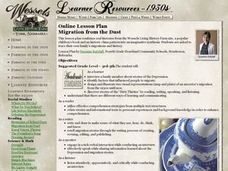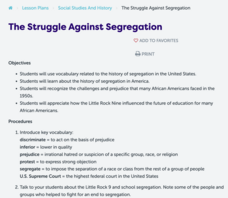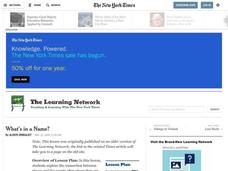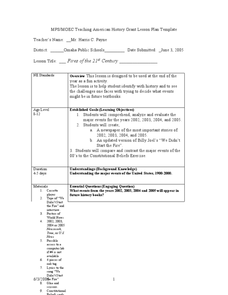Curated OER
A Dictionary of Democracy
Students create dictionary of terms for citizens of a democracy, using events and biographies from both their state's history and U.S. history.
Curated OER
Hands-On Investigation!
Learners read, analyze, and solve a mystery using problem-solving skills. They explore the History Detective website, discuss the difference between clues and red herrings, complete a dot-to-dot sheet, take notes in a detective...
Curated OER
Origin of the Modern Olympic Games
Students using a Venn diagram, compare and contrast the modern and ancient Olympic games. They write essays and construct timelines about the games. Students, using various items, create tools for a new Olympic game and write the...
Curated OER
Making the Connection With Quilts
Fourth graders explore history of Underground Railroad in Indiana and discover how slaves were assisted on their journey using codes displayed in different quilt blocks. Students examine connection quilts have to ancestry and family...
Curated OER
Ways of Thinking
Students explore all the different avenues of the concept of different ways of thinking by involving the views of several great minds of history to thinkers of Western Civilization. They assess questioning, life, work, skepticism,...
Curated OER
Growing up in Las Vegas; Memories of Childhood in the Neon City
High schoolers investigate the history of Las Vegas through conducting interviews. For this oral history lesson, students locate and speak with older residents of Las Vegas in order to gain a better understanding of the city. High...
Curated OER
Made in China
Students create a power point presentation. In this Chinese inventions and discoveries lesson, students view sample products that are the product of ancient Chinese civilizations and their innovations and discoveries. Students select a...
Curated OER
Strawberry Girl: Lesson 3 - Trains, Sails, and Trails
Young scholars read two chapters of Strawberry Girl by Lois Lenski and complete activities about Florida's transportation history. In this literacy and economics lesson, students read two chapters of the book, talk about their journal...
Curated OER
Mom, Where Do TV's Come From?
Students explore the history of television using the lifetime achievements of Milton Berle as a springboard for studying social and technological advances in American entertainment. They, in groups, examine the role of television through...
Curated OER
Local Pride in a Guide
Students examine the distinctive cultural and historical attributes of Boston and Philadelphia. They research the history, geography and culture of their town or city to create a booklet.
Curated OER
Migration from the Dust
Young scholars trace their own family's migrations and history. They listen to the story, 'Blue ow.' They design a plate which is shared at an open house.
Curated OER
Analyzing and Evaluating Holocaust Literature
Young scholars examine the history of the Holocaust through literature. Using different pieces of literature, they critique the items in terms of being historical accurate and its value in telling the stories of the Holocaust. They...
Curated OER
Comparative Genocides
Learners examine genocidal events throughout history. Using the internet, they research these events and compare and contrast them with the Holocaust. They analyze the amount of inhumanity towards others throughout history. In groups,...
Curated OER
The Struggle Against Segregation
Students use vocabulary related to the history of segregation in the United States. They study about the history of segregation in America and recognize the challenges and prejudice that many African Americans faced in the 1950s....
Curated OER
The Notorious Hope Diamond: What Makes an American Legend?
Students view and discuss a video on the legend of the Hope Diamond then compare and contrast other tales such as Paul Bunyan, Pecos Bill and Johnny Appleseed. They analyze basic characteristics of these legends then use descriptive...
Curated OER
What's in a Name?
Students explore how one uses examples from history to inform themselves of past and present events. After reading an article, they examine the significance of renaming a base in Germany after a soldier who survived the Holocaust. They...
Curated OER
Taking the Witness Stand
Students identify a pivotal event in world history that they would have liked to have witnessed. They then research this event and write a first-person account of it as if they had been present. Their first-prerson account is modeled...
Curated OER
Heroes and Heroines: King David, Julius Caesar, Cleopatra and Napoleon
Students identify and examine four heroes from history and imaginative literature. They discuss the characteristics of a hero and share perceptions of what makes a hero. By comparing and analyzing a few historical and literary figures,...
Curated OER
Understanding the Declaration of Independence
Students identify and interpret the Declaration of Independence and the rights and privileges demanded in the document. They also identify how those rights and privileges have affected our history. Students then research about the...
Curated OER
Fires of the 21st Century
Young scholars explore historical perspectives. In this contemporary history instructional activity, students listen to Billy Joel's "We Didn't Start the Fire," discuss they lyrics, and add a new verse to the song for the years 2002,...
Curated OER
The Holocaust: An Introduction for Children (To Be Used with Number the Stars)
In this literature and history worksheet, students prepare to read the novel by Lois Lowry Number the Stars. Students read the history behind the Nazi occupation of Denmark and the arrest of the Jews there. This is a 10 page historical...
Curated OER
Great Basin Tribes- Use of Land for Sustenance
Students explore four Native American tribes from Nevada. In this Native American history lesson, students identify and generate important corresponding attributes of the Southern Paiute, Northern Paiute, Washoe, and Western Shoshone...
Curated OER
Using the Commentaries in Class
Students examine language and communication by listening to a commentary radio show. In this communications lesson, students listen to Michael Josephson's radio broadcast using the Internet and analyze his words and their meaning....
Curated OER
The Beginnings of Constitutional Government
Students examine excerpts of Thomas Paine's Common Sense. For this early American history lesson, students read Paine's pamphlet and analyze the information according the rubric provided.

























